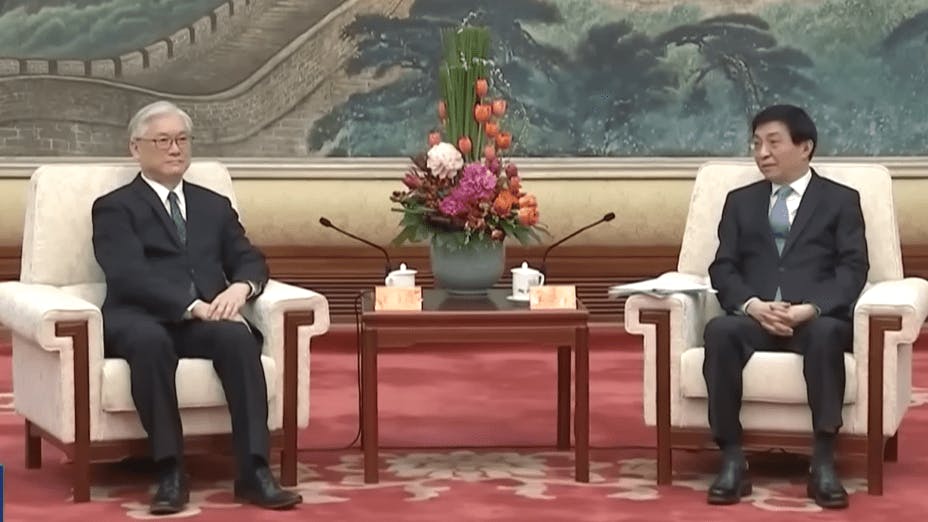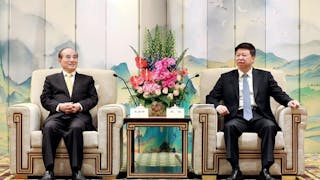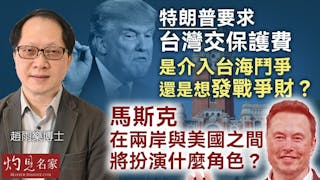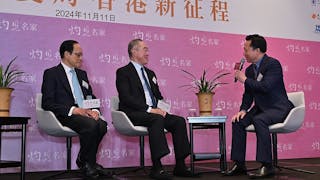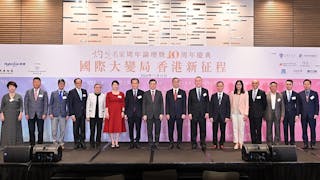國民黨副主席夏立言訪問北京,2月10日會見中共中央政治局常委、相信會接任全國政協主席的王滬寧,對兩岸關係的發展具有重要意義。
據新華社報道,王滬寧首先代表中共中央總書記習近平和中共中央對夏立言一行致以新春的祝福和問候,這是對國民黨方面禮待的姿態。
王滬寧強調鞏固反台獨的共同基礎
其次,王滬寧表示,中國共產黨將全面貫徹落實中共二十大精神和新時代黨解決台灣問題的總體方略。
王滬寧又說,大陸方面將全面貫徹全面貫徹落實習近平總書記關於推動兩岸和平發展、促進兩岸交流合作的重要指示精神。目的是團結廣大台灣同胞,共創國家統一、民族復興的偉業。
王滬寧說,「台獨」與和平水火不容、與台胞福祉背道而馳。王滬寧認為,恢復兩岸交流往來是兩岸人民的共同願望。
王滬寧強調,沒有誰比兩岸同胞更重視要和平、要安寧、要過好日子的願望。兩岸同胞對正常交流往來的意願強烈,當務之急是盡早恢復兩岸交流正常化。王滬寧表示,中國政府歡迎和支持更多台灣同胞參與到中國式現代化和民族復興進程,共享大陸發展成果和民族復興的榮耀。
王滬寧還強調,國共兩黨要進一步鞏固堅持「九二共識」、反對台獨的共同政治基礎,深化政治互信,保持良性互動,加強交流合作,堅決反對台獨分裂和外部勢力干涉,共同維護台海和平穩定,促進兩岸交流合作,造福兩岸同胞,攜手致力民族復興。對王滬寧而言,中華民族的復興是一個不可逆轉的歷史進程。大陸各族人民正共同努力,為實現中華民族的偉大復興而奮鬥。王滬寧總結說,夏立行一行此次參訪一定能夠充分感受到大陸同胞的信心和幹勁,親眼目睹大陸發展的光明前景。
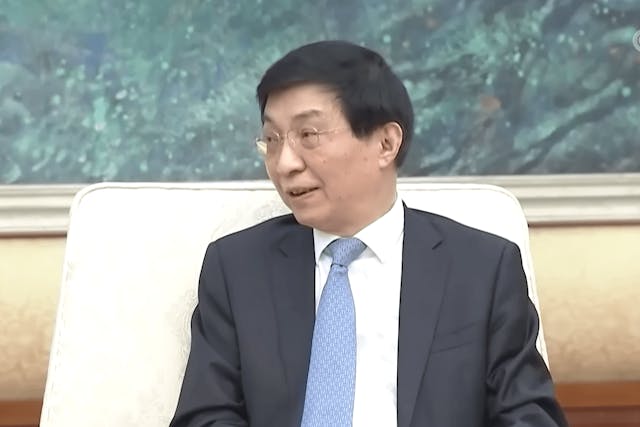
夏立言:以智慧化解衝突
夏立言回應王滬寧的談話,他感謝習近平總書記的問候。他說,兩岸人民同為炎黃子孫,希望今後國共兩黨在堅持「九二共識」、反對台獨基礎上,增進互信溝通,加強交流合作,共同造福兩岸民眾,促進台海和平穩定。
國民黨還發表新聞稿稱,夏立言訪問大陸,讓人想起18年前的2005年國民黨主席連戰的那次開創性訪問,當時兩岸關係緊張──這話暗示夏夏立言本人2023年訪問大陸期間,兩岸關係同樣緊張。2005年連戰訪問大陸後,大陸與台灣負責兩岸事務的負責人定期會晤,促成了馬英九與習近平的成功會晤。夏立言表示,這些會議不僅證明了國民黨兩岸政策的「正確性和重要性」,且也是國共兩黨合作下,不可忽視的重大成就。
夏立言還表示,從過去的歷史經驗看,只要雙方能夠繼續交流對話、累積互信,以智慧化解衝突,用包容尋求共識,把維繫台海和平當成重要目標,相信沒有什麼困難是不能化解的。
對於夏立言訪問大陸,台灣陸委會2月10日晚間發文,強調兩岸交流互動應基於理性平等、相互尊重,更應進一步尋求務實溝通、相互理解、化解分歧。陸委會呼籲「中共高官須思考建設性、有意義的務實處理之道」,而非「將疫後健康交流的契機,操作成台灣人民排拒的政治宣傳與統戰分化工具」。陸委會還表示,如果北京堅持對台灣「政治、軍事與經濟脅迫」,便是「與台灣人民福祉背道而馳」,更會「對區域和平造成危害」。陸委會總結認為,兩岸溝通不應設前提。
同樣,夏立言訪問大陸也遭到民進黨批評,民進黨將王滬寧視為「一國兩制台灣方案」與「新時代黨解決台灣問題的總體方略」的「背後影武者」。民進黨認為,夏立言應認真向大陸當局傳達台灣社會的「主流民意」,而不是「公開唱和中共的統戰言論」。
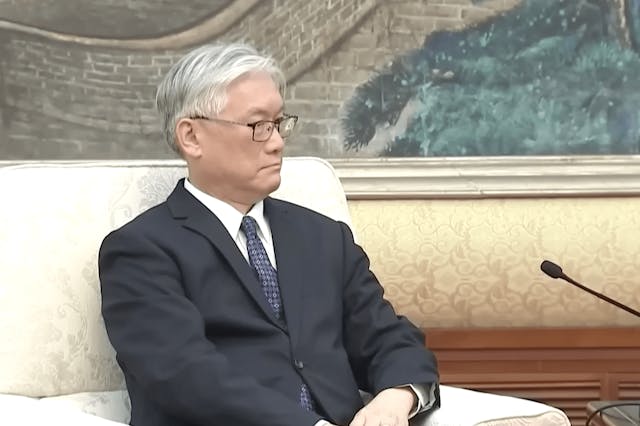
兩岸的破冰之旅
客觀來說,夏立言此次大陸之行具有重要的政治意義。
首先,這是國民黨在大中華地區遭受新冠疫情肆虐3年後首次對大陸進行高層訪問。因此,在新冠病毒及其變種逐漸消失之際,夏立言的訪問是一次破冰之旅──標誌着未來幾個月兩岸的人員交流將不可避免地增加。
其次,正如夏立言在北京的講話中所暗示的那樣,他的訪問是在兩岸關係仍然緊張的時候進行的,部分原因是「外部因素」的複雜性。美國眾議院前議長佩洛西於2022年8月上旬訪問台北,使兩岸關係陷入新的緊張狀態,幸而大陸和台灣雙方都很好地處理了外部引發的危機。中美關係錯綜複雜,美台關係糾纏不清,令兩岸關係複雜化。王滬寧呼籲夏立言和國民黨反對外部勢力干涉台灣事務時,直指兩岸關係問題的核心,即美國在北京─台北─華盛頓三角政治關係中的糾葛和複雜性。
第三,分析王滬寧的言論,可以看出他突出強調兩岸和平與合作。因此,中國大陸仍然渴望以和平方式解決台灣問題。儘管包括美國軍方在內的一些觀察家預測,大陸未來可能動用武力對付台灣,然而事實是,大陸當局至今仍堅持對台灣採用一國兩制模式,來因應台灣的政治文化。問題的關鍵是如何讓台灣模式更靈活,更適應台灣人民的需要,或許更「聯邦化」,給台灣更多「自治」,從而達到雙贏。果真如此,包括夏立言等人在內的國民黨當局的作用,就是與大陸當局進行互動,並以更深入的方式與他們接觸,以尋求兩岸可接受的和平解決方案。
大陸懷柔政策 針對大選準備
第四,從批評的角度來看,民進黨對夏立言訪問大陸的回應仍然是強硬而不老練的。台灣與大陸之間的任何人員交流和互動都被視為「負面的」、「產生不良後果的」,會落入「統戰」的陷阱。這種態度不利於兩岸的溝通與對話。民進黨要想在2024年台灣總統選舉中贏得更多選票,就必須研究和制定更細緻的大陸政策,而不是對台灣人採取過度消極的態度,因為台灣人可以成為海峽兩岸之間不可或缺的中間人。
第五,大陸目前對國民黨的懷柔政策,或許可以解讀為國民黨準備2023年年中至2024年初的總統競選做準備。無論誰代表國民黨參選,在總統選舉中,他或她將不得不制定更細緻的大陸政策。這樣,如果國民黨總統候選人能拿出台灣版的「一國兩制台灣方案」,國民黨總統候選人的大好機會就來了。一國兩制不僅為中共方面接受,也為台灣「主流民意」接受,那麼國民黨贏得2024年總統選舉的機會將大大增加,挑戰在於如何規劃出各方都能接受的台灣「自治」模式。
總而言之,在兩岸新冠疫情肆虐3年後,夏立言對大陸的訪問是一次開創性的訪問。國民黨仍然是有巨大潛力與大陸當局討論如何能夠設計、制定和修改「一國兩制台灣方案」,讓所有持份者,特別是台灣人民都能接受的唯一政黨。當前,中國共產黨熱衷於以和平方式處理台灣的政治未來,反映出目前的過渡期給參與2024年初台灣總統大選的各方提供了一個黃金機會,為台灣的未來研究創新和可行的政治解決方案。有趣的是,複雜性和不確定性來自美國及華府的政策。鑑於國民黨不僅可以與中國共產黨對話,還可以與美國當局對話,國民黨智庫及其高層可以說是北京─台北─華盛頓之間複雜關係對話的重要中間人和代理人,有望為台灣政治前途帶來真正和平的解決方案。
Andrew Hsia’s visit to Beijing and its implications
The visit of Andrew Hsia, a vice chairman of the Kuomintang (KMT), to Beijing and his meeting with Wang Huning, a member of the Standing Committee of the Politburo of the Communist Party of China (CPC) and an expected new chairman of the Chinese People’s Political Consultative Committee (CPPCC), on February 10 had important implications for the development of cross-strait relations.
According to the Xinhua news, Wang Huning firstly represented CPC General-Secretary Xi Jinping and the CPC’s central leadership to express their Chinese new year’s best wishes to Hsia – a diplomatic remark and gesture to the KMT side.
Secondly, Wang said that the CPC would comprehensively implement the spirit of the 20th Party National Congress and the overall directional blueprint on how to solve the question of Taiwan in the new era.
Moreover, according to Wang, the mainland side would fully implement the important directive and spirit of CPC General-Secretary Xi Jinping to promote the peaceful development of the two straits and to promote their exchange and cooperation. The objectives are to bring about solidarity with the Taiwan comrades, and to create the enterprises of national reunification and the Chinese renaissance.
Wang added that “Taiwan independence” is incompatible with peace and that it is contrary to the well-being of the Taiwan comrades. The urgent task for the two straits, to Wang, is to resume normal exchange and interactions – a common aspiration of the people from both sides.
Wang emphasized that nobody would surpass both sides to attach immense importance to peace, calmness and the desire to experience good life. As such, there is a very strong and common demand from both sides to resume normal interactions between the mainland and Taiwan. The Chinese government, Wang said, supports more Taiwan comrades to participate in the process of building up Chinese modernization, promoting the development of Chinese renaissance, and sharing the fruits of mainland’s developmental experiences and the glory of Chinese rejuvenation.
Wang Huning also stressed that the CPC and KMT should go one step further by consolidating and insisting on the principle of the 1992 consensus, by persisting in the principle of opposing “Taiwan independence,” by deepening mutual political trusts, by maintaining positive mutual action, by strengthening mutual cooperation and interactions, and by opposing the interference from external elements. Both CPC and KMT should maintain the peaceful development of the two straits, bringing about welfare and promoting the Chinese renaissance. Chinese renaissance, to Wang, is an irreversible historical process. Various nationalities in the mainland have been working together to bring about the Chinese rejuvenation. Wang concluded that Andrew Hsia’s visit must let him fully sense the trust and energies of the mainland Chinese and he must witness the bright future and prospects of the mainland development.
In response to Wang’s remarks, Hsia expressed his gratitude to the congratulatory note from General Secretary Xi Jinping. Hsia commented that, as sons and daughters of the Chinese nation, the people from both Taiwan and the mainland hope that both KMT and CPC persist in the foundation of supporting the principle of 1992 consensus and opposing “Taiwan independence,” and that both sides would foster mutual communication, strengthen collaboration and promote peace and stability across the two straits.
The KMT also issued a news report saying that Hsia’s visit reminded us a path-breaking visit of KMT chairman Lien Chan eighteen years ago in 2005 when the two straits had tense relations – a remark implying that Hsia himself visited China in 2023 during which the relations between the mainland and Taiwan remained tense. After the Lien Chan visit in 2005, the two sides had regular meetings of their chiefs responsible for cross-straits affairs, leading to the successful meeting between Ma Ying-jeou and Xi Jinping. These meetings, according to Hsia, were a testimony to not only the “correctness and significance” of the KMT’s cross-strait policy but also the KMT-CPC’s important achievements.
Andrew Hsia also said that, from the experiences of the past, if both sides can continue to have exchange and dialogue, accumulate mutual trusts, utilize wisdom to solve conflicts, use toleration to search for consensus, and to maintain cross-strait peace as important objectives, then all the problems would not be so difficult to be solved.
In response to Hsia’s visit, the Taiwan Mainland Affairs Council (MAC) on the night of February 10 said that the exchange and mutual interactions between the mainland and Taiwan side should be built on rationality, equality, mutual respect, practical communications, mutual understanding and the desire to solve divergent differences. The MAC appealed to the mainland side to be more “thoughtful, constructive, and meaningful practical” rather than “adopting political propaganda as a means to exclude participation and united front as a divisive tool.” The MAC also remarked that if Beijing persists in “political, military and economic coercion,” then this is “contrary to the well-being of the Taiwan people” and this can “undermine regional peace.” The MAC concluded that mutual communication should not have preconditions.
Similarly, Hsia’s visit to the mainland has been criticized by the Democratic Progressive Party (DPP), which regarded Wang Huning as the “behind-the-scene” planner of the Taiwan model of “one country, two systems” and the overall blueprint of solving the problem of Taiwan in the new era. It argued that Hsia should seriously reflect the “mainstream views” of the Taiwan society to the mainland authorities rather than harping on “the united front remarks of the CPC.”
Objectively speaking, Andrew Hsia’s visit to the mainland is politically significant.
First and foremost, this is the first KMT’s high-level visit to the mainland after three years of Covid-19 attack on the Greater China region. As such, Hsia’s visit is an ice-breaking one at a time when Covid-19 and its variants are fading away – a move that signals the inevitable increase in human interactions across the two straits in the coming months.
Second, Hsia’s visit, as he implied in his remarks in Beijing, came at a time when the relations between the two straits remain sour partly because of the complications of “external element.” The Nancy Pelosi visit to Taipei in early August 2022 plunged the two straits into a new level of tensions, albeit fortunately both mainland and Taiwan sides managed the externally-generated crisis well. The complex relations between China and the US, and the entangled relations between US and Taiwan have complicated the Beijing-Taipei relations. When Wang Huning appealed to Hsia’s KMT to oppose external intervention in Taiwan matter, he pointed to the heart of the problem of Beijing-Taipei relations, namely the complexities and entanglement of the US in the triangular politics of Beijing-Taipei-US connections.
Third, analysing Wang’s remarks, we can identity his prominent emphasis on peace and cooperation between the two sides. As such, mainland China is still eager to solve “the problem of Taiwan” in a peaceful manner. Despite the predictions from some US observers, including military ones, that the mainland would likely use military force to deal with Taiwan’s future, the reality is that so far mainland authorities remain insistent on the usage of the Taiwan model of “one country, two systems” to cope with Taiwan’s political culture. The crux of the issue is how to make the Taiwan model more flexible, more adaptable to the needs of the Taiwan people, and perhaps more “federal” with more “autonomy” to Taiwan so that a win-win situation would be reached. If so, the role of KMT authorities, including Hsia and others, is to interact with mainland authorities and to engage them in a more intensive way so as to explore an acceptable and peaceful solution for the two straits.
Fourth, the DPP’s response to Hsia’s visit remains hard-line but unsophisticated, from a critical perspective. Any communication and interaction between the people of Taiwan and their mainland counterparts are seen as “negative,” “counterproductive” and falling into the trap of “united front.” This attitude is not conducive to communications and dialogue between the two straits. If the DPP is keen to win more votes in the 2024 presidential election in Taiwan, it has to explore and develop a more sophisticated policy toward the PRC rather than adopting an overly negative attitude toward those Taiwan people who can constitute an indispensable intermediary between the two straits.
Fifth, the mainland’s currently softer policy toward the KMT can perhaps be interpreted as a move to pave the way for the KMT to prepare its presidential campaign from mid-2023 to early 2024. No matter who will be the candidate representing the KMT to participate in the presidential election, he or she will have to develop a sophisticated policy toward the mainland. Here, a golden opportunity for the KMT presidential candidate will emerge if he or she can come up with a Taiwan version of the “Taiwan model of ‘one country, two systems.’” If this KMT version of the Taiwan model of “one country, two systems” is acceptable to not only the CPC side but also “the mainstream view” in Taiwan, then the KMT chance of winning the 2024 presidential election will be significantly enhanced. The challenge is how to map out this Taiwan model of “autonomy” acceptable to all sides.
In conclusion, Andrew Hsia’s visit to Beijing is a path-breaking one after three years of Covid-19 development in the two straits. The KMT remains the only party that has tremendous potential to discuss with the mainland authorities on how a Taiwan model of “one country, two systems” can be designed, shaped and revised in a way acceptable to all the stakeholders, especially the people of Taiwan. The CPC at the moment is keen to adopt a peaceful approach to dealing with Taiwan’s political future, reflecting that the current transition leading to the Taiwan presidential election in early 2024 is providing a golden opportunity for all sides to explore innovative and feasible solutions to the political future of Taiwan. The complexities and uncertainties came from, interestingly, the US and its policy. Given the fact that the KMT can speak to not only the CPC but also the US authorities, the KMT think tank and its authorities are arguably significant intermediaries and brokers in the complex relationships between the Beijing-Taipei-US dialogue that hopefully will bring about a really peaceful solution to Taiwan’s political future.
原刊於澳門新聞通訊社(MNA)網站,本社獲作者授權轉載。網址:
https://www.macaubusiness.com/opinion-andrew-hsias-visit-to-beijing-and-its-implications/



